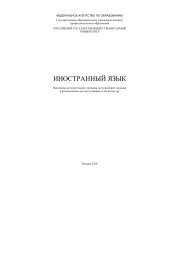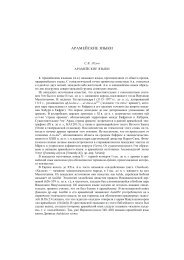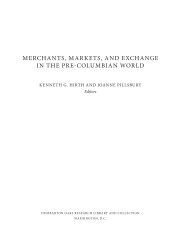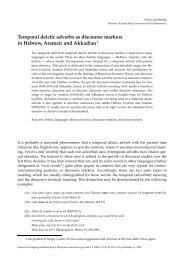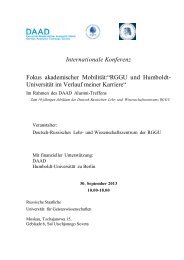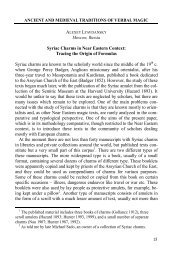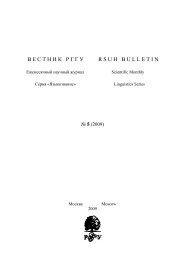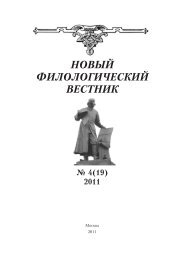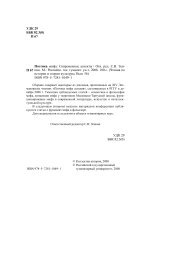760 Morphosyntax and Text Structure in <strong>Akkadian</strong>The rest of <strong>the</strong> entries and a discussion chapter will be published in<strong>the</strong> future issues of B&B. In <strong>the</strong> meantime, I am going to put forward afew interpretative observations. In Loesov 2005, I claim that <strong>the</strong> Pres.iparras has problems coding telic events, and this is because iparras is supposedlyan “Old <strong>Present</strong>.” Yet an obvious question arises: How did thiscome <strong>about</strong> while no competing New <strong>Present</strong> was emerging, since <strong>Akkadian</strong>(unlike most o<strong>the</strong>r branches of Semitic) developed no New <strong>Present</strong>?4 I suggest a speculative answer to this question. <strong>Akkadian</strong>, like mostSemitic languages, felt a need to renew <strong>the</strong> methods of coding <strong>the</strong> <strong>Present</strong><strong>Time</strong> sense. From <strong>the</strong> perspective of <strong>the</strong> Central Semitic, <strong>the</strong> easiestway to do so would have been to create a denominative <strong>Present</strong> using <strong>the</strong>base of <strong>the</strong> Active Participle. Yet, for <strong>Akkadian</strong> this path was unavailable,because what <strong>the</strong> traditional grammar of <strong>Akkadian</strong> calls “Participle” is anagent noun fully preserving its morphological (i. e., derivational) meaningwhen used predicatively, as e. g. in an OA sentence rābi´āti atta ‘youare a representative.’ The predicative use of <strong>the</strong> Participle is very rare,and it is never used as an attributive adjective. Thus, in an <strong>Akkadian</strong>translation of English sentences like, “I saw a playing child/burningbuilding,” we would be unable to use participles as attributive adjectives<strong>the</strong> way <strong>the</strong>y are used in English. To quote Kouwenberg forthcoming8.4.3, “Since <strong>the</strong> <strong>Akkadian</strong> present participle is primarily an agent noun,cannot express concomitant action, and is hardly ever used as a predicate,it is an unlikely source for <strong>the</strong> creation of new tense/aspect forms.”As a matter of fact, <strong>the</strong> Proto-Semitic nominal pattern *R 1 āR 2 iR 3 - itselfwas a garden variety agent noun and no “participle,” 5 so, in order to ultimatelybecome <strong>the</strong> source of a New <strong>Present</strong> in various daughter languagesof <strong>the</strong> Proto-Semitic, R 1 āR 2 iR 3 - had in <strong>the</strong> first place to get firmlyentrenched in <strong>the</strong> nominal predicate slot (a step never taken by Ak-4I thank Dr. Kouwenberg for posing such a question to me in a p. c., as wellas for his critique formulated both in our correspondence and in his forthcomingbook The <strong>Akkadian</strong> Verb and Its Semitic Background (= Kouwenberg forthcoming),which he sent me as a manuscript. Much of my thinking <strong>about</strong> <strong>Akkadian</strong> verb hasbeen taking shape in an ongoing dialogue with Kouwenberg’s ideas, which, I believe,will profoundly impact our understanding of <strong>the</strong> <strong>Akkadian</strong> grammar in <strong>the</strong>years to come.5This is born out by <strong>the</strong> way <strong>the</strong> reflexes of <strong>the</strong> PS *R 1 āR 2 iR 3 - are used innoun phrases of individual Semitic languages, in particular in Biblical Hebrewand Aramaic.
S. Loesov, <strong>Akkadian</strong> <strong>Sentences</strong> <strong>about</strong> <strong>the</strong> <strong>Present</strong> <strong>Time</strong> (<strong>II</strong>/2) 761kadian), and hereafter to be adjectivized in this very slot, i. e., to undergoa shift from “X [is] a doer” to “X [is] doing.” 6Now <strong>the</strong>n, <strong>the</strong> etymologically primary meaning of <strong>the</strong> SC is <strong>the</strong> resultativeone, i. e. it is far away from depicting ongoing events. Cross-linguistically,<strong>the</strong> resultative forms of transitive verbs may have both passiveand active readings (Nedjalkov ed. 1988), which is especially true of <strong>the</strong><strong>Akkadian</strong> SC. Yet, <strong>the</strong> “active” resultative is unstable, it is not salient (“observable”)or relevant enough: <strong>the</strong> resultative sense is much easier orientedpatient-wise than agent-wise, since it is <strong>the</strong> patient that is normallyaffected by a transitive action. This is why <strong>the</strong> “Active Statives” of <strong>the</strong> traditionalgrammar were easily shifting to dynamic (fientive, non-resultative)uses, which, as I claim in Loesov 2005, can be both perfective (Preterite-like)and progressive (<strong>Present</strong>-like). Faute de mieux, <strong>Akkadian</strong>pressed this inherent resource into <strong>the</strong> service of renewing <strong>the</strong> <strong>Present</strong><strong>Time</strong> semantic domain. Ano<strong>the</strong>r relevant feature is <strong>the</strong> imperfective natureof <strong>the</strong> Stative-Resultative: Imperfectivity is a semantic element that resultativeverb forms share with genuine dynamic <strong>Present</strong> Tenses, and thiscommonality may also have played a part in <strong>the</strong> assumed shift. 7 Kouwen-6Note that <strong>the</strong> denominative New <strong>Present</strong> of Aramaic had no chance to emergethrough a shift from <strong>the</strong> noun phrase to <strong>the</strong> nominal sentence (*a doing X > X [is]doing), since in Aramaic R 1 āR 2 iR 3 - is not a productive attributive adjective.7This topic is fraught with <strong>the</strong>oretical questions <strong>about</strong> motives and mechanismsof grammatical change. The real problem is: Could iparras give up (andshare with something else) part of its present-tense functions if no innovativeform or construction that was destined to win, i. e., to replace iparras completely,was in view? The problem of a more or less stable grammatical competition wasmost recently treated (among o<strong>the</strong>r <strong>the</strong>mes related to <strong>the</strong> notion of “linguisticcomplexity”) in Dahl 2004. Östen Dahl adduces some well-known instances of“pattern competition” in <strong>the</strong> contemporary European languages, e. g. voy a trabajarand trabajaré in Spanish, “<strong>the</strong> choice between <strong>the</strong> perfect and <strong>the</strong> simple pastas ways of expressing past time reference in languages such as English or Scandinavian”(p. 129), variation of “short” and “long” inflectional forms of predicativeadjectives in Russian. He believes that “[c]ompetitive situations like <strong>the</strong> ones mentionedhere are difficult for <strong>the</strong> structuralist ideal, with a system of neat oppositions‘où tout se tient’ ” (ibid.). As noted in <strong>the</strong> previous parts of this study, inwritten records of <strong>Akkadian</strong> <strong>the</strong>re exists a kind of competition between <strong>the</strong> Pres.and <strong>the</strong> SC in <strong>the</strong> <strong>Present</strong> <strong>Time</strong> domain. This applies mostly (but not exclusively)to outspoken semantically low-transitivity verbs, both with and without a directobject. A list of such verbs found earlier includes akālum ‘to have usufruct of,’baqārum ‘to claim,’ ašāum ‘to need, desire,’ kalûm ‘to hold, detain,’ nazāqum ‘toworry,’ parādum ‘to care, be afraid,’ takālum ‘to trust,’ wa´ûm ‘to have exit,’ wašābum‘to live, be around.’



